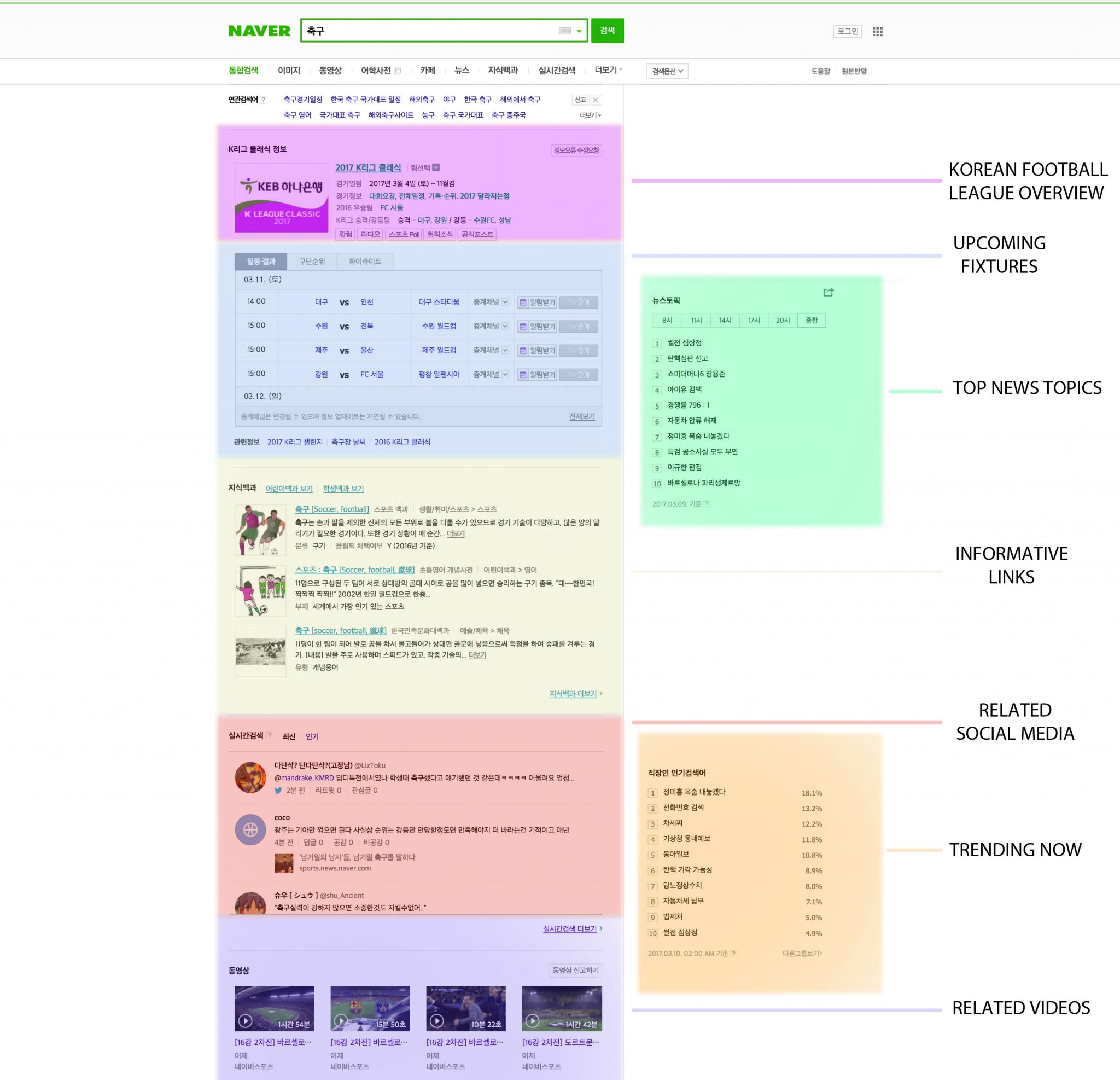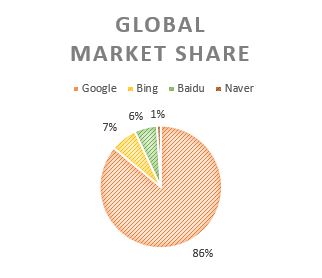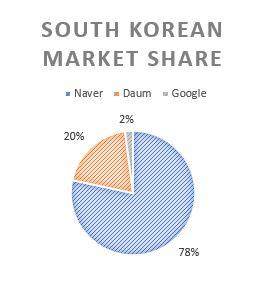News and Insights
Google Vs Naver: Google’s struggles – South Korea In Focus
March 13, 2017
When we think about companies that traverse the digital landscape with seemingly omnipotent power, Google, amongst others, springs to mind. The number of people using Google is huge and for a majority it is their go to search engine with around 3.5 billion searches a day.
However, there are countries where Google is unable to get a foothold in the market. China and Russia are two well known examples with Baidu and Yandex respectively.
The Chinese search engine Baidu reported having 513 million users in 2016 meaning that around a quarter of all internet users are found in China. The success Baidu enjoys is arguably due to a ban placed on Google in China in 2011. It’s layout is largely similar to that of google with a simple homepage and a strikingly similar SERP. Chinese censorship of Google stopped them dead in their tracks, meaning Google is unable to tap into the largest internet using nation on the planet.
The Russian company Yandex have been slowly losing market share to Google and in April 2016 Google surpassed Yandex in monthly mobile audience. Google’s improved standing in the Russian search engine market can be largely accredited to it’s success on mobile. Google’s rise in the Russian market is still ongoing as it strengthens it’s ability to provide relevant results in the Russian Cyrillic alphabet.
A third lesser known country is South Korea and the reasons for Google’s lack of success in this region are equally as complex.
Layout
The differences between Naver and Google are glaringly obvious when comparing their homepage appearance and content.
At first glance the Naver homepage looks cluttered and busy but this is only in comparison to the minimalist approach of Google. When we dissect the homepage we find that it covers a range of topics, news stories and weather. Across the top banner there are links to “mail” “café” “blog” “dictionary” “shopping” “news” “stock market” “music” “books” and “cartoons”.
When we look at the google homepage we are presented with a search bar and little else to distract us. It is not until we have entered a search term and hit enter until we are presented with any content.
To many users in South Korea, Naver is more than a search engine. Many use the site as a hub where they can see news on a range of their interests and receive suggestions and get ideas for things to search for. It acts as a page users can browse, with plenty of rich media content that may lead users to search for more news on a topic of interest.
This multi-dimensional functionality means that whilst users may go elsewhere for certain things such as e-commerce and travel sites, Naver operates as the Korean homepage of the internet.
Comparing SERPs – Google vs Naver
I entered the following search term “축구” which means football into Naver and Google and had a look at the results. Unsurprisingly the Naver SERP displayed a far wider range of information relevant to the search term. We can see an overview of the Korean football league with upcoming fixtures, links to other sports, the history of football, relevant news topics, related social media and recent videos. Comparatively, the Google SERP offers little in the way of relevant content.
I spent some time talking to Korean friends of mine about why and when they use these two search engines. These conversations helped me gain an insight and try to begin to understand the way Google and Naver are perceived. Whilst the chats were informal and the ideas given only provide an anecdotal understanding, the overwhelming response was that they rarely, if ever, use Google.
An unscientific observation I made is that the younger tech-savvy generation are aware of Google Chrome and use it as their default whereas the less tech savvy use IE and are unaware of the benefits of the switch. Chrome users still favoured Naver but generally speaking, had more experience in using Google.
The two reasons they preferred Naver that I kept hearing were that they preferred the layout and the highly relevant content it provided.
For Google, these two reasons present quite a challenge. Users essentially love about Naver the two things that make a search engine a search engine.
As Naver is, and has been the most popular search engine for over a decade in South Korea it has been the ‘go to’ for a generation that have grown up with the internet at their fingertips. This familiarity twinned with the mass of user generated content Naver now holds means that it is unlikely its superiority will face real competition in the foreseeable future. “Determined to lock-in its search traffic, Naver has been reluctant to allow content generated by its subscribers to be used by other search engines.”
Naver is aware that it is top dog and the preservation of this position is something it values greatly. Currently, the content Naver is able to provide its users is what means it has around 80% of the search engine market share in South Korea. Furthermore, it appears that Google’s USP in that it is very good for accessing English-language content is not a distinct strength or one that generates any significant interest.
Naver, it seems, has an untouchable position in South Korean search. It is able to provide the most relevant content in a format the is appreciated to an adoring, loyal audience.
A final hurdle Google must overcome is that the use of Naver is as ingrained in Korean society as eating kimchi and celebrating Chuseok.
The Race for Domestic Domination in South Korea
Globally, Google is by far the most popular search engine commanding around 80% of the market. The closest competitor is Baidu with a comparatively measly 7% owed in large part to the ban placed on Google in China. Naver has no market penetration outside of Korea which means it’s domestic success is crucial for its long-term survival.
Google took steps back in 2008 with acquisition of Tatter and Company, a Korean blogging platform to try to boost and bolster their position but the attempt has been largely unsuccessful.
Whilst the search results Google are able to display are limited due to restrictions made by Naver they face another problem in understanding the Korean alphabet Hangul. Though Hangul is a a well-designed mathematical alphabet that is reasonably simple to pick up, Google is not as well equipped to understand search queries.
It appears Google and Naver are racing to achieve an accurate translation service to be rolled out in South Korea. “Two companies ― Google and Naver ― have so far adopted the NMT in the Korean-English translation, gearing up to gain an upper hand in the infant AI industry here.
In October, Naver, the nation’s No. 1 portal service operator, launched its own NMT service, Papago. Google also unveiled its upgraded translation service the following month, equipped with its AI software.” (Korea Times)
It is apparent that Google is interested into breaking into the Korean market and to do so requires the ability to offer a service that rivals Naver. It may be a long time before this goal is achieved.
It is my opinion, and I’ll go out on a limb here, and say that Naver will dominate the search engine market in South Korea for a long time to come.
-
TAGS:
- Technology




